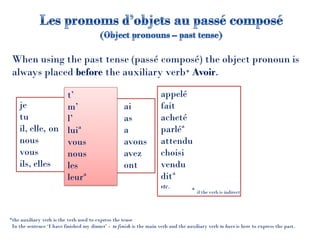Signaler
Partager
Télécharger pour lire hors ligne

Contenu connexe
Tendances
Tendances (20)
LEXIQUE: LA ROUTINE, LES LOISIRS ET LES MOMENTS DE LA JOURNÉE

LEXIQUE: LA ROUTINE, LES LOISIRS ET LES MOMENTS DE LA JOURNÉE
Lexique rédiger une demande, une réclamation à son employeur

Lexique rédiger une demande, une réclamation à son employeur
En vedette (20)
Passe Compose with Etre (Dr. and Mrs. P Vandertramp)

Passe Compose with Etre (Dr. and Mrs. P Vandertramp)
Similaire à French object pronouns (past)
Similaire à French object pronouns (past) (20)
PRESENT_PERFECT.pptxssssssssssssssssssssssssssssssssssssssssss

PRESENT_PERFECT.pptxssssssssssssssssssssssssssssssssssssssssss
Plus de Apprenons Woodley
Plus de Apprenons Woodley (20)
French object pronouns (past)
- 1. ai as a avons avez ont je tu il, elle, on nous vous ils, elles When using the past tense (passé composé) the object pronoun is always placed before the auxiliary verb* Avoir. *the auxiliary verb is the verb used to express the tense In the sentence ‘I have finished my dinner’ - to finish is the main verb and the auxiliary verb to have is here to express the past. t’ m’ l’ luiª vous nous les leurª appelé fait acheté parléª attendu choisi vendu ditª etc. ª if the verb is indirect
- 2. ai pas as pas a pas avons pas avez pas ont pas je tu il, elle, on nous vous ils, elles and in the negative form.... ne t’ ne m’ ne l’ ne luiª ne vous ne nous ne les ne leurª appelé fait acheté parléª attendu choisi vendu ditª etc. ª if the verb is indirect
- 3. À vous maintenant... You are now ready for exercises of Level 5 and 6 of this course. These exercises focus on placing the object pronouns before the auxiliary verb. In these 2 exercises, you must type in the missing words: Bonne leçon! je xx parlé (you – inf.) you must type in je xx pas appelé (you – inf.) you must type in eg. t’ai ne t’ai
